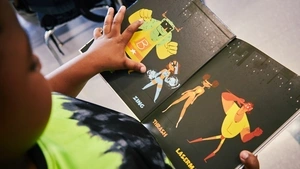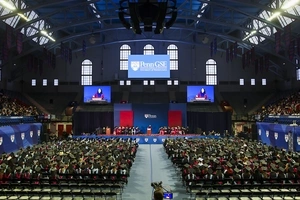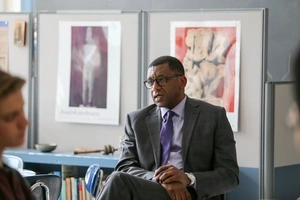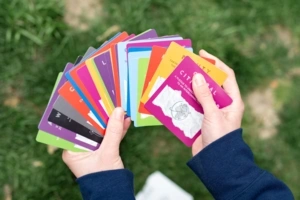West Philadelphia kids weren't the only ones learning at this year's Summer Program, hosted by Penn GSE and the Netter Center. A team of emerging Penn GSE professionals earned valuable on-the-ground experience as counselors during the six-week session. The counseling curriculum included tools such as breathing, mindfulness, and motivation, with an emphasis on integrating these tools into a student's everyday life — rather than waiting for a conflict or crisis to occur.
The long shadow of the pandemic continues to affect both academic performance and socio-emotional skills, said Caroline Watts, who oversaw the counseling aspect of the program. Many West Philadelphia kids have endured not only interrupted learning and a loss of social interaction time, but also the stress of living during an epidemic of gun violence. "That mental health environment is taking a toll," said Watts, who is the director of the Office of School and Community Engagement.
The comprehensive mental health curriculum provided by counselors in the summer program meant that kids had a caring adult available to them at all times of the day. This included Thursday sessions that featured different wellness topics. We caught up with four of the counselors to hear about their experience this summer.
Cletus Leon (School & Mental Health Counseling 2021)
"We want to expose the students to different methods of self-care and understanding and how to cope with things. We worked with them to be prepared, to be motivated for the future, and to take good care of themselves. Especially in the last couple years, we thought a curriculum with a focus on mental health was important, so we provided this psychoeducational training with activities in and out of the classroom. The curriculum has a focus on mental health to teach the students to support themselves and those around them.
You can see in them a yearning to understand, to use these techniques actively in their lives — to check in on how they are feeling, and how those around them are doing. They have been using these tools — breathing, writing, and reflecting — and I've seen it firsthand. Students are checking in on each other and caring for each other. It has been an overwhelming positive experience."
Carly Wickham (Professional Counseling 2022)
"I work with the youngest group, the second-grades and third-graders. Especially when our curriciulum focuses on wellness, it has been freeing for them. They are given words to describe what they are feeling. They understand what coping skills are. Now, they come up to us and say, 'I need to take a break.'
Before, they just sit there angry — not knowing they have options and not knowing what they can do. So it helps them out and it helps them out. Being proactive like this is so helpful for the kids as they prepare to transition back to school. They will have these tools to take with them, and it will be good for the teachers and the schools."
Taylor Smith (Professional Counseling 2022)
"The kids get to know who we are, and that gives them more adults they can go to when they need something. The teachers aren't here all week, and they have to oversee 12 to 20 kids at a time. So it helps to have extra adults who are trained in how kids can cope with their emotions, with their anger — how they can avoid lashing out against people and learn how to communicate.
Each week of our wellness curriculum is about a separate topic, so they learn about wellness in various areas. They can identify the type of issue they are dealing with, and know who to go to when it comes up. And when something happens, if there is a crisis response, then they can come to us in addition to other people. It works out really well."
Semaj Capers (Professional Counseling 2023)
"The kids can come up to us and tell us they're tired, that they're hungry, whatever the case may be. We're really accessible. We're not stuck in a room giving lessons. We are there during lunch, we see them throughout the day. We see them in the hallways. They don't have to be sent to us. We are there. I see the support aspect of this, and I watch these three wonderful counselors I work with, and kids will come up and hug them."
Media Inquiries
Penn GSE Communications is here to help reporters connect with the education experts they need.





